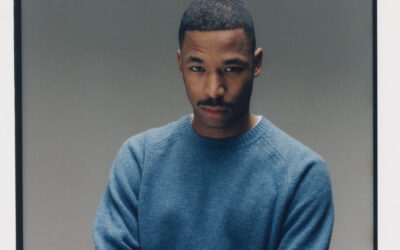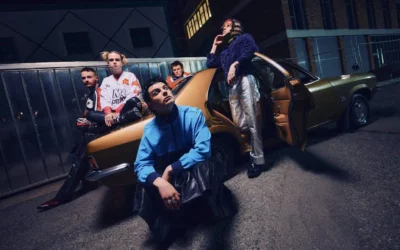There are certain dreams that we thought were inaccessible. So when we decided to write to Josh Klinghoffer to ask him a few questions about To Be One With You, his superb first solo album, we thought that the demand would remain unfulfilled. However, a few weeks after leaving the Red Hot Chili Peppers, he agreed to give us one of the first interviews of his new project. Origins of this approach, vision of music and future of Dot Hacker: Josh Klinghoffer reveals the birth of Pluralone.
La Vague Parallèle : Hi Josh! You just released the first record of your new solo project, Pluralone, how do you feel?
Pluralone : Hi there. Forgive me for taking a little while getting back to you. A lot has happened since the release of To Be One With You. I don’t remember how I felt in November. Right now I feel good. Happy that it’s out. A little stressed out opening these Pearl Jam shows BY MYSELF, but also very, very excited.
LVP : First of all, I would like to talk about to the choice of this name, Pluralone. Why did you choose this name? Is this a way for you to deal with all the musical identities that coexist in you?
P : No, there wasn’t anything too personal to do with the name. I thought of it back when we were trying to name Dot Hacker.
I mean, it sort of has roots in the belief that everything is one, everything is connected and comes from the same material, yet we are plural. There is enormous plurality. Around the world. In one’s own mind. In every decision or move we make, there is often many ways to look at something, yet often, we’re all looking for oneness. To be complete, often together. Oneness, together. Pluralone. I also love watching people be unsure and say Plur-alone. I can’t tell if it’s a good name or totally infantile. Might be both. Plurality.
LVP : You have already released very different things under this name: studio covers of foreign classic titles that you had already played live, and now this record which is more in line with what you have produced with Dot Hacker. Is also the name Pluralone a way for you to be able to release such different titles by freeing you from the labels of genre?
P : Yeah, it was just a way to have a moniker under which to release all manner of things. It doesn’t always have to be just me. I like the idea of it evolving. Basically I just hate everything about my given name with a childish fervor, and refuse to release music under it.
LVP : Can you tell us about the way you composed and recorded this record? Between the tour you did with the Red Hot Chili Peppers and the different projects you have collaborated on, how did you manage to produce such a rich record? Is it sometimes difficult to juggle such different projects?
P : It is most definitely difficult to juggle projects. Somehow I did it, but it is hard.
Thank you for saying it’s rich. It was composed over the course of several years in the sense that a few of them were written years prior to the making of this record. Segue might date back to 2010. Was Never There was 2012. Crawl, however was written the night before it was recorded. I never finish off the lyrics until I have an avenue to send the song down. So, in a sense they were all finished in the summer of 2018. Jack Irons and I recorded for a week in September of that year. I always have a huge pile of songs and through a combination of memory and listening back to the anally labeled ideas folder I have, I pull songs out when it seems like a good time to work on them.
LVP : For this project, you collaborated with many different artists (Flea, Chad Smith, Jack Irons, Eric Avery …). How and why did you choose them? What part did they play in the disc creation process? We also know that you are multi-instrumentalist and that you could have played all the instruments used in the record. Why did you choose to call other musicians?
P : All the people I have on the record with me are dear friends. Flea plays on a song (and a B-side) that were originally thought of as Red Hot Chili Peppers songs. It seemed like he was the only person that should put bass on them to me.
Eric Avery and Eric Gardner had been doing some playing together in the band Garbage and have a thunderously beautiful thing when combined. We were in the studio working on something else we’d done together and I wrote Crawl after a conversation about songs with drum machines and hearing one in a different place. I snuck it in at the end of the session.
It had always been my intention to get the other three Dot Hacker members on the record somehow. Sadly, Jonathan couldn’t make it in, so I just ripped him off completely in a few places. When I play drums, or when I think of drumming, Jack Irons and his magical feel are pretty much aways what I’m after. The fact that my life has brought me to a place where he is playing on songs I conceived… It’s shocking. Same with Eric Avery. He is as close to a mentor as I’ve had in my life, since far before I had met him, and the fact that we’ve become friends is just remarkable. Dan Elkan is a dear dear friend of mine that I’ve known since we were twelve. He is a beautiful musician and I hope to exploit that many, many more times in the future. Clint Walsh’s solo and playing on Shade, like Flea with Was Never There, came from him reacting favourably to it at a Dot Hacker practice years ago. I instantly couldn’t imagine the song without him on it.
Nate Woolcot is just a complete and absolute musical inspiration to me. I’ve had the great privilege of knowing him for years and drinking coffee with him all over the world. I’m also am well aware that I misspelled his last name. It’s Walcott.
LVP : The release of this record comes more than two years after the release of the last Dot Hacker album. Does that mean the band is on a break for the moment?
P : Because of my responsibilities with the Red Hot Chili Peppers, Dot Hacker wasn’t really able to carry on a proper work schedule. The other guys all have pretty busy schedules as well. In the past, every time I knew I had some time off coming, The Dots planned something if we could.
This time around, I basically decided to wait and see if anyone reached out about playing. No one did, so I made this record on my own. They are some of my closest friends, so I don’t see that band being over at all. We might play tomorrow, actually.
LVP : Over the years, you have developed a very singular and personal way of singing, which favors the sounds, sometimes at the expense of articulation and pronunciation. What importance do you give to the text in your songs? How do you work your voice so that it sticks best to your melodies?
P : Very interesting question. I grew up with music that was hard to understand. I suppose that coupled with being young and just not caring to much about the specific text. There is a feeling and a sound and that can do it all.
Of course the lyric is another place to create and it’s become so important to me. It’s sort of the most important thing to me now. I still, for whatever reason, feel most comfortable singing in a way that places the importance on rhythm and sound. The lyric has to be the to inspire the singing and make it last, connect, or inspire (even oneself) but for me, it also has to sound right coming off the tongue.
So many times when I’m recording, I’m asked to annunciate more and a lot of the time, it’s the correct suggestion because left to my own devises, my vocals would sound like another language, but sometimes, they must remain sonically where they came from, so I often try to write words that fit with the original, improvised demo recording. Was that a run-on sentence? Yeah, I always feel that I make a lot of progress as a singer and writer, then have to stop doing that for a while. Perhaps now I can focus mainly on that for a bit.
LVP : I can feel a certain ambivalence between light and darkness in the title of the record, in the texts and in the general atmosphere, like an inner conflict that would find its resolution in your music. Is the Pluralone project also a work of personal and musical introspection?
P : The light and dark are always there. I’d say everything I do has a lot of introspection.
LVP : I have the feeling that a number of songs are also built as mantras, with incantations that are repeated. What message, what energy did you want to convey to this record?
P : I feel like I’m always more or less talking about the same things. About how beautiful and how awful things are at the same time. So often, you can trace the meaning of these songs back to the same (one) place.
LVP : In this record, we can find the chords progressions and the rythmics that are so characteristic of your work. Where do these structures come from?
P : I don’t know where any of it comes from. More and more I marvel at where ideas emerge from.
I race to turn the phone or recorder on before the idea goes away. I have a limited knowledge of music from a theoretical side but I’ve always been fascinated by writers who can do something complex with the writing of a song or a chord structure and have it be a subliminal aspect to what you’re hearing. It’s just a pretty or moving piece of music. Then if you sit down to figure it out and see that there is a little more than meets the ear, or some intelligence at work, I’m really interested. I’ve not made a conscious decision about how much theory to learn, or stop myself from learning, it’s just laziness, I think, AND a real feeling of loving to not think when I play. I suppose the more things that come natural, the bigger your vocabulary is. I should be learning more, just as I should be reading more.
But then again, I hear saying “should this” and “should that” isn’t a good idea. Just be. Try.
LVP : The cover of the album beautifully transcribes the evanescent and planing atmosphere of the record. What’s the story behind this cover ?
P : It’s a photo taken by a friend of mine called Nora. When I met her, somehow her photos or her photo taking came up and I found this online somewhere. I instantaneously knew this was the cover of the next record I made.
I think it was a year or so before To Be One With You was even conceived. I just saw it and loved it. She used some drips and did somethings to the negative as it was developed. Those specifics we’d have to ask her. I love that image. I think it’s one of the best album covers of all time. I hope the music lives up to it.
LVP : Last time you played in France with the Red Hot Chili Peppers, you played a wonderful cover of Je suis venu te dire que je m’en vais. Do you listen to a lot of French music? La Femme had opened for you on this occasion. What do you know about the emerging French scene?
P : I wouldn’t say I know a ton about the current state of French music, but couldn’t say I know much about the current state of any music.
I love Serge Gainsbourg and anything associated with him. His daughter’s records, Jean-Claude Vannier’s L’Enfant Assassin Des Mouches. Jane Birkin’s record Di Doo Dah. I have a particular fondness for Vu de l’extérieur though. I’m trying to rattle off names of other French artists in my head and Michel Polnareff comes to mind.
I’ve always been a big fan of Francoise Hardy as well. There are so many more I’m just blanking at the moment, for it’s been a while since I’ve ravenously searched new music. I have SO MUCH MUSIC, it’s hard to keep on top of things.
LVP : We imagine pretty well how this project could incarnate live in a rather intimate formula. Do you plan to play these songs on stage? How do you imagine it?
P : I do! There will be a solo version of some of these songs played on the upcoming Pearl Jam tour of North America and then after that, hopefully, I’ll make another record and tour both of them together. Things can change rather quickly so it’s rather hard to make plans.
LVP : Eye Opener is probably the song I listened to the most during my teenage years. I find the textures and general atmosphere of the song immensely haunting and beautiful. Could you tell us about how this song came to be?
P : Eye Opener started with some chords Clint Walsh was playing on the Rhodes in Dot Hacker’s tiny first practice space. If I remember correctly, there was a period in November of 2008 when Eric was out on tour and the three of us who weren’t worked on songs and got chords together.
That song started with Clint’s verse and went from there. That whole bridge section, with the big key change, I don’t know what I was thinking with that one. My memory of that was it just happening. The chords just started tumbling out. We all just followed.
That was one of the original Dot Hacker songs. Dot Hacker kind of has a similarity to the NHL in that there was an “original six.” Wait, I’m wrong, we have the “original five.“ Darn, well, still, there were 5 original songs, then we added 2 more, then filled out the first record one by one. Even though I’m off by one, that’s always how I think of it and those songs, like the original hockey teams in the NHL.
LVP : In this song, you said you “can’t talk to anyone who looks [you] right in the eye”, but since then you seem to have grown into a more comfortable spot. How did you overcome your shiness ? Do you have any tips for introverts ?
P : That that been a life long struggle. When I was 17, I realized that being shy and fearful was NOT gonna get me anywhere in life and I had to try and make changes. I’m not sure how much you can really change but just being aware of it is a step.I’m still pretty uncomfortable socially (sometimes) and I’m still trying to work through it.
Tips? Well, this is recent stuff for me, but just look at where these thoughts about yourself are coming from. Who’s saying them? Your mind? Are they true? No. They’re just thoughts. Stop a minute and just look at your mind. Watch what it’s saying. Watch the craziness cascading and ask yourself, where is this coming from and is any of it worth listening to. Maybe after doing that, when you’re being shy or uncomfortable, you’ll remember that the things that your mind are telling you, are just thoughts attacking your sense of wellbeing. They needn’t be given much mind.
LVP : Finally, you helped a lot of people around the world discover the fantastic Tinariwen. Can you share a recent musical discovery with us?
P : Big Thief is my favourite new band at the moment, and here’s one to go digging for, a record made by a project called Hater from the mid 90’s. Exquisite.
Pratiquant assidu du headbang nonchalant en milieu festif. Je dégaine mon stylo entre deux mouvements de tête.


